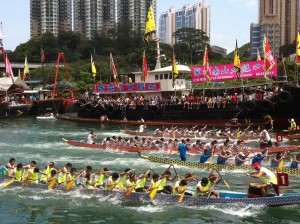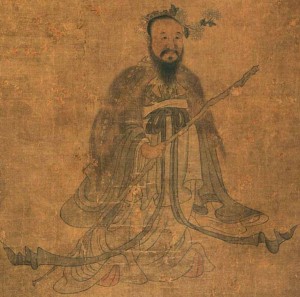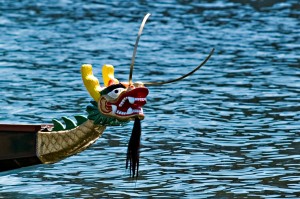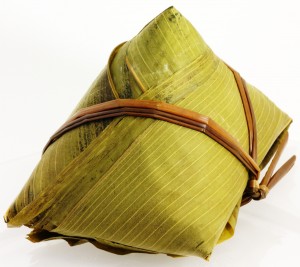端午节 Dragon Boat Festival
Information About the Holiday | Common Sights During This Holiday | Festive Activities | Recommended Books, CDs and DVDs
Information About the Holiday
The Dragon Boat Festival began more than two thousand years ago to honor the memory of a poet and statesman named Qu Yuan (say “chew yuen”). Qu Yuan was a loyal minister to the king of the state of Chu. This festival is often called “double fifth” because it is celebrated on the fifth day of the fifth moon. In Chinese, the festival is called 端午节, duān wǔ jié (say “dwan oo jieh”).
During the festival, hundreds of people gather along the banks of rivers and lakes to watch long, thin, brightly colored dragon boats race. These beautiful wooden boats have dragon heads attached to the front of the boat and dragon tails attached to the back. Dragon boats can be as long as 100 feet and carry up to 80 paddlers. Most boats today, however, are only 40 feet long and carry about 20 paddlers. In each boat there is a leader who sits at the front of the boat and beats a drum to tell the paddlers when to paddle. The person who steers the boat sits at the back.
After watching the dragon boat races, people spend the rest of the day watching street theater performances, setting off fireworks, spending time with family, and eating special dumplings called “zòngzi”, 粽子 (say “zohng dz”). Zongzi are a traditional food of the Dragon Boat Festival and are made to honor the memory of Qu Yuan. They are made out of “sticky” rice wrapped in bamboo or reed leaves and tied up with string.
THE TALE OF QU YUAN
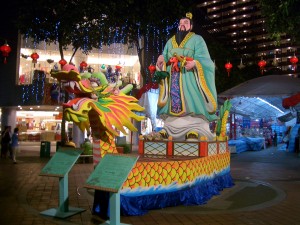
Qu Yuan on a Dragon Boat as depicted in a sculpture on display in Singapore during the Dragon Boat Festival. Photo by Vmenkov
Qu Yuan (say “chew yuen”) was a loyal minister to the king of the state of Chu. He loved his country very much and worked very hard for the king. Some of the other ministers didn’t like Qu Yuan so they told the king mean lies about him. Soon Qu Yuan was sent away and told never to return.
For 67 years, Qu Yuan lived outside of the state of Chu and wrote beautiful poems about how much he loved his country. He became a hero who was admired by many people because of his loyalty to the king and his love for his country. On the 5th day of the 5th moon, in 278 B.C., Qu Yuan drowned in the Miluo (“me lo-wuh”) River.
One day, not too long after Qu Yuan’s death, a fisherman went to the Miluo River to fish. He threw rice into the river to please the River God before he cast out his nets. Suddenly, he heard a voice coming from the water.
“I’m hungry!” the voice shouted.
The next day, the fisherman threw extra rice into the water before he cast out his nets. But again, he was startled by a voice shouting, “I’m hungry! Give me more to eat!”
The third day, the fisherman brought a heavy bag of rice with him and dumped the whole bag into the river. Just as he was about to cast out his nets, a vision of an old man appeared in a cloud of mist.
“Who are you?” asked the fisherman.
“I am the spirit of Qu Yuan, the poet. I am still very hungry as the river dragon is faster than I am and eats all the rice before I can eat even a single grain” said the vision.
“What can I do?” asked the fisherman.
“Wrap the rice in leaves and tie the packages with colorful strings. The dragon won’t be able to untie the packages and the bright colors will scare him away. Make sure you also throw some rice into the water for the dragon; that way, we will both be happy.”
The fisherman did exactly as he was told and never heard from the spirit of Qu Yuan again. From that day on, the fisherman always threw rice into the river for the dragon and his nets were always full of fish.
Common Sights During This Holiday
龙舟 Dragon Boat: Dragon boats are wooden boats have dragon heads attached to the front of the boat and dragon tails attached to the back. Dragon boats can be as long as 100 feet and carry up to 80 paddlers. Most boats today, however, are only 40 feet long and carry about 20 paddlers. In each boat there is a leader who sits at the front of the boat and beats a drum to tell the paddlers when to paddle. The person who steers the boat sits at the back.
粽子 Zongzi Dumplings: Zongzi come in many different shapes and contain many different fillings depending on the region where they are made. Most contain sweet glutinous rice and are wrapped in bamboo leaves. In southern China, people prefer salty zongzi with meat, while in northern China, sweet bean paste or date filled zongzi are more common. Typical zongzi ingredients include: cured fatty side pork, dried peanuts, mung beans, millet, red beans, dried shrimp, salted duck egg yolk, dried red dates
Festive Activities
Make a Model Dragon Boat: Model Dragon Boat Instructions
Hold Chopsticks Races: Chopsticks Race Instructions
Attend a Dragon Boat Race Near You! Worldwide Dragon Boat Calendar
Recommended Books, CDs and DVDs
Awakening the Dragon by Arlene Chan
Paddles Up!: Dragon Boat Racing in Canada by Arlene Chan
Dragon Boats: A Celebration by Pat Barker
The Dragon’s Pearl by Julie Lawson
Moonbeams, Dumplings & Dragon Boats by Nina Simonds


